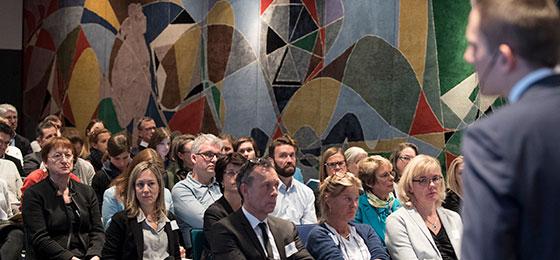Researchers, politicians and practitioners share input

Where does Switzerland stand in the fight against antibiotic resistance? Experts used the symposium “Antibiotic resistance” in Bern as an opportunity to present an overview.
Stakeholders must all work together to ensure antibiotics remain effective against infectious diseases in future too. The more than 80attendees at the symposium in Bern on 14 November were in agreement on this point. Public Health Switzerland, an association of healthcare professionals, extended invitations to the event under the heading “Antibiotic resistance – where do we stand?”.
One of the objectives was to promote networking and exchanges between actors from a wide range of domains. Interest in the symposium was keen: besides NRP 72 researchers, it attracted representatives from human and veterinary medical associations, the Swiss Association of Pharmacists, hospitals, cantonal health departments, research institutions and pharmaceutical companies, and the World Health Organization (WHO).
Research strengthens national strategy
Several speakers presented brief synopses of the current situation, including a status update on the Swiss federal government’s national antibiotic resistance strategy (StAR). Focusing heavily on the One Health approach, it is aimed at securing the long-term efficacy of antibiotics for humans and animals. Karin Wäfler, StAR Project Manager with the Federal Office of Public Health, explained that measures had already been initiated in most areas under StAR and that few areas were still untouched. As a positive trend, she reported that the use of certain critical antibiotics in veterinary medicine has decreased by up to 25 per cent over the last two years.
But there is still a lot more to be done. And in many areas the necessary instruments are not in place and recommendations for action have not been issued. It is up to the scientific community to act on this. This is why Pascal Strupler, Director of the Federal Office of Public Health (FOPH), considers it a stroke of luck that StAR and NRP 72 are running concurrently: “The research findings will close gaps in our knowledge and make strategy implementation more efficient."
Christoph Dehio, president of the Steering Committee of NRP 72, outlined those areas where research is seeking solutions, and what can be expected. Based on the One-Health approach, which underpins both Swiss and international strategies, research is focusing on different areas. The projects of NRP 72 are divided into three modules: research on the development and spread of resistance, new drugs and faster diagnostic techniques, as well as the optimised use of antibiotics. Dehio also highlighted that new insights alone will not be enough: “If scientific results are to be effective in practice, we need a long-term implementation strategy and strong support from politicians and authorities.”
Working closely with practitioners
Several speakers then presented their research projects, illustrating the different research areas. Professor Hanspeter Nägeli of Zurich University’s Institute of Veterinary Pharmacology and Toxicology introduced the online platform AntibioticScout, which he and his team developed in the context of NRP 72. Designed to provide practical support for veterinarians, it also serves as a resistance reporting system. “We engage with practitioners and use their feedback to continually improve the platform,” says Nägeli. The team is currently carrying out a survey on how using the platform is impacting antibiotics consumption.
In the field of human medicine, Laurence Senn, preventive medicine specialist at the Centre hospitalier universitaire vaudois (CHUV) and NRP 72 researcher, reported on an awareness-raising programme which she and her team are carrying out at nine hospitals in French-speaking Switzerland. They are examining whether hospital doctors use antibiotics more systematically if their prescribing habits are regularly assessed and they are given feedback. Senn is convinced that progress can only be made if awareness-raising measures are continued, in particular during medical training.
”We will see great progress in the next few years.”
In the concluding panel discussion, the role of patients was one of the points discussed. How do doctors best deal with patients who demand antibiotics even though there is no therapeutic benefit? Carlos Quinto, member of the central committee of the FMH, believes that it is up to the doctors: ”They need to take the time to explain the situation to patients.” Pharmacists also play an important role in transferring knowledge. Another point of discussion were the prices of antibiotics: many of them are very cheap by now and cost less than a diagnostic test or a vaccination. In particular in veterinary medicine, this creates a situation where antibiotics are used very readily. The low prices are partly responsible for the fact that companies have no real incentives to develop new drugs. “But it would be wrong to look for culprits in individual areas,” says Daniel Koch, Head of the Communicable Diseases Division at the FOPH. ”There is an enormous potential for improvement in all areas – and we will see great progress in the next few years.”
